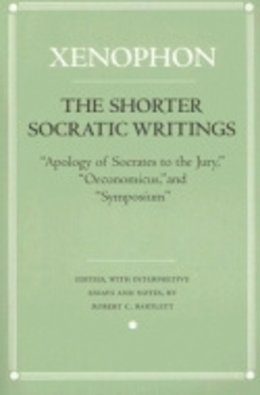
The Shorter Socratic Writings: Apology of Socrates to the Jury, Oeconomicus, and Symposium
Xenophon
This book presents translations of three dialogues Xenophon devoted to the life and thought of his teacher, Socrates. Each is accompanied by notes and an interpretative essay that will introduce new readers to Xenophon and foster further reflection in those familiar with his writing. "Apology of Socrates to the Jury" shows how Socrates conducted himself when he was tried on the capital charge of not believing in the city's gods and corrupting the young. Although Socrates did not secure his own acquittal, he profoundly impressed some listeners who then helped to shape the public perception of philosophy as a noble, if highly idiosyncratic, way of life. In "Oeconomicus," Xenophon relates the conversation Socrates had on the day he turned from the study of natural philosophy to that of moral and political matters. "Oeconomicus" is concerned most directly with the character and purpose of Socrates' political philosophy. Xenophon provides entertaining portraits of Socrates' circle of friends in the "Symposium." In the process, he conveys the source of every individual's pride in himself, thus defining for each a conception of human excellence or virtue. The dialogue concludes with Socrates' beautiful speech on love (eros) and its proper place in the good or happy life.
Product Details
About Xenophon
Reviews for The Shorter Socratic Writings: Apology of Socrates to the Jury, Oeconomicus, and Symposium
Review of Metaphysics
Brings together translations, along with introductions and notes, of Xenophon's minor writings. In keeping with the series's dictates, the translations are literal, word-for-word correspondence, allowing the Greekless reader to follow where Xenophon uses consistent language or where different terms affect the nuance. Since the translations are by different scholars, this policy is helpful, and the translators succeed in producing consistent, literal, and readable versions, though occasionally testing the limits of Greek and English idiom... McBrayer's volume makes Xenophon's shorter works considerably more accessible to a nonspecialist audience.
Choice
